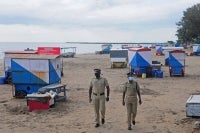Natural Resources, Environment, and Climate Change Ministry mulls need to proceed with drafting of Bill on Transboundary Haze
16 Oct 2023 06:26pm

Natural Resources, Environment, and Climate Change Minister Nik Nazmi Nik Ahmad said this was due to challenges encountered during the drafting of the proposed bill, including issues related to agreements at the Asean level. - BERNAMA
Minister Nik Nazmi Nik Ahmad said this was due to challenges encountered during the drafting of the proposed bill, including issues related to agreements at the Asean level.
"Based on the experiences of other countries, such as Singapore, we know there are several constraints when implementing such legislation. We also observe the most successful example is the agreement called the Air Quality Agreement between Canada and the United States,” he told reporters after launching the Semarak Transformasi Siswa Madani Perak programme at Universiti Pendidikan Sultan Idris (UPSI) here today.
The formulation of a Bill on Transboundary Haze was first proposed by NRECC during the Pakatan Harapan (PH) administration in 2018 but was not pursued under the Ministry of Environment when Perikatan Nasional (PN) took over.
Nik Nazmi said the ministry is also looking into efforts to improve the Asean Agreement on Transboundary Haze Pollution (AATHP) by incorporating provisions related to penalties for parties causing transboundary haze.
The minister said haze is a regular topic of discussion at the annual sub-regional Asean meetings, but these discussions have not been effective in resolving the issue of transboundary haze.
"So, we will try to explore all options, including agreements or a Transboundary Haze Bill, or improving the AATHP as a solution to the haze problem, in line with Asean’s goal to be haze-free by 2030,” he said.
On the current haze situation, Nik Nazmi said, at present, the haze is under control and not as severe as it was in 2019.
While acknowledging the increase in health-related cases due to the haze, he said that rainfall and control measures implemented by plantation companies have helped minimise the impact of the haze. - BERNAMA
Download Sinar Daily application.Click Here!














